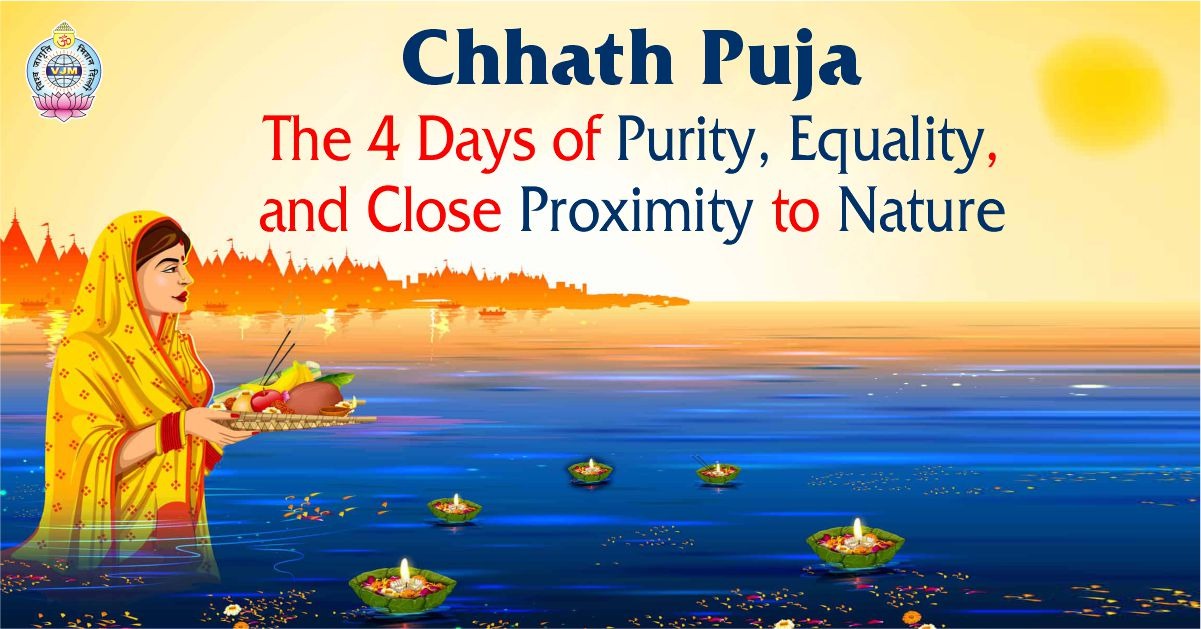Chhath Puja – the 4 Days of Purity, Equality, and Close Proximity to Nature
Chhath Puja—the 4 Days of Purity, Equality, and Close Proximity to Nature
In India, the land of vast biodiversity, there are hundreds of communities, cultures, and traditions, which have hundreds of festivals.
Each Indian festival has a unique cultural, social, and spiritual message, and these festivals make people realise their deep connection and oneness with the various elements of nature.
Chhath Puja is one such festival.
Devotees celebrate the 4-day festival with great devotion in various parts of India, including Uttar Pradesh, Bihar, Jharkhand, Delhi, and Maharashtra.
The Indian Diaspora spread across the globe celebrates the festival to stay connected to their roots.
The festival is dedicated to the sun God and Shashthi Devi, also known as Chhathi Maiya, or Goddess Chhathi.
The beautiful festival epitomizes purity, non-discrimination, and love for nature in a splendid way.
The Sun: The Symbol of Purity
The Sun, undoubtedly, is our living God. He is the purest element of nature. When it shines, it purifies each and every part of the atmosphere with its heat and aura.
And therefore, in many cultures, the sun is seen as a symbol of purity. In ancient Greece, the sun God Apollo was often associated with healing and purity.
In various Native American cultures as well, it is seen as a powerful force that can bring about positive change through the virtue of purity.
And so, during the 4-day Chhath festival, a great emphasis is given to purity.
Devotees go to a great extent to maintain purity in the body and surroundings.
The whole atmosphere gets filled with beauty, auspiciousness, fragrance, and purity.
And when devotees offer Prasad and Arghya (offering of water) to God while standing in a body of water, it naturally exudes a sense of inner purity and peace.
The Celebration of Equality
The Chhath festival honours the Sun God, Chhathi Maiya, and His consorts, Usha (Goddess of Dawn) and Pratyusha (Goddess of Dusk).
These divine forms are worshipped and their blessings are invoked when the sun sets in the evening on the 3rd day and when the sun rises in the morning on the 4th day.
During Chhath in the morning, worship of the first ray of the sun and the last ray in the evening are conducted to show gratitude and seek blessings for the entire family.
And these rituals are conducted irrespective of gender.
The Chhath Puja is a gender-neutral festival.
Both men and women fast and perform various rituals without any discrimination during the festival.
Such a show of equality is divine in its own way.
Deep Emphasis on the Environment and Nature
During the entire festive period, a beautiful show of respect and proximity to nature is reflected. In fact, it is regarded as one of the most environmentally friendly festivals.
The festival is not idolatry in nature; rather, it is a highly eco-friendly way of celebrating various elements of nature.
People participate in cleaning rivers and water bodies, ponds, and lakes to make them suitable for worship.
Many seasonal fruits and cereals are used during the festival that combines nature, the Kharif harvest, and the local economy in a wonderful way.
Needless to say, the Chhath festival resonates with the overall message of purity, equality, and proximity to nature.
Celebrate the festival with Nahaaya Khaaya, Kharna, and worship of the Sun God with Pratyusha and Usha.
May the Sun God and Chhathi Maiya fulfil all your wishes and you experience peace, prosperity, happiness, and the wellbeing of your family.

